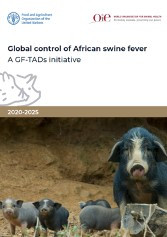A recent announcement by the World Organization for Animal Health (OIE) and the Food and Agriculture Organization (FAO) of the United Nations calls for a global response to African swine fever (ASF) that focuses on disease control, a collaborative framework and a business continuity plan to help protect trade against devastating losses.

In recognition that pork is the world’s most consumed meat (35.6% of global meat consumption), the organizations announced a joint Global Framework for the Progressive Control of Transboundary Animal Diseases (GF-TADs) 2020-2025. The global Initiative aims to foster national, regional and global partnerships to strengthen control measures and to minimize the impact of ASF.
The three primary objectives of the global framework are to:
1) Improve the capability of countries to control (prevent, respond, eradicate) ASF using OIE standards and best practices based on the latest science;
2) Establish an effective coordination and cooperation framework for global control of ASF; and
3) Facilitate business continuity to ensure safe production and trade to protect food systems. For more details with outputs and outcomes, see the graphic.
“Today, 51 countries are affected by African swine fever,” said Matthew Stone, OIE deputy director general for international standards and science. “Amid the difficult situation posed by COVID-19, ASF continues to spread, intensifying the current health and socioeconomic crises.”
The specific goals of the effort include no new countries with ASF infections, fewer countries affected by ASF, a decline in overall ASF cases and reduced economic losses due to ASF. While the initiative’s authors acknowledge that meeting all the criteria may not be possible in the short term, they argue that meeting some of them would indicate an improvement in the global situation and offer motivation and justification to remain committed to the initiative.
The OIE says that many countries affected by ASF lack sufficient human, financial or technical resources to rapidly detect, respond and contain animal diseases, which underscores the need for a global effort.
Click here to see more...